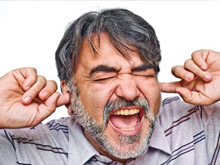Health Topics
-
Healthy Living
-
|
|
October 2009
|
| 10 Steps to a Heart-Safe Diwali |
| Dr Suvro Banerjee |
| |
 |
Crackers are as indispensible to festivities as sweetness is to laddoos. But like too much of anything, loud-sound producing crackers are not too friendly to the heart, especially for those with existing heart ailments. |
The loud noise from crackers may trigger heart attack in those who have angina (chest pain due to reduced blood supply in the coronary arteries). The sudden shock of a loud blast may shoot up the blood pressure of those with hypertension (high blood pressure) and this may even precipitate stroke.
While it is difficult to directly point fingers at crackers for causing heart disease in an otherwise healthy person, it is a known fact that noise pollution causes anxiety, which results in stress. Stress increases the level of certain chemicals like catecholamine, steroids and interleukins, which raise blood pressure, serum cholesterol and clotting tendency of blood, all of which increase the potential for heart attack.
For patients having ischemic heart disease (reduced blood supply due to narrowing of coronary arteries) or who have suffered earlier heart attack and are taking medicines, there is risk of increasing the severity of chest pain and this may even precipitate a fresh heart attack. People who have undergone angioplasty or bypass surgery are somewhat protected from heart attack but still run the risk of rupture of plaque and new blockage.
Those who suffer irregular heart rhythm (cardiac arrhythmia) may experience an increase of symptoms like palpitation (uncomfortable pounding sensation in chest), dizziness, shortness of breath or sudden loss of consciousness for brief period (black out). For those having serious rhythm disturbances like Ventricular Tachycardia may even suffer from cardiac arrest, where the heart stops pumping and this needs immediate resuscitation to prevent fatal consequences.
For those with heart failure (a condition where the pumping action of the heart is compromised due to underlying heart, lung or kidney condition), the loud sound may increase the heart rate and blood pressure, forcing the heart to pump faster and harder, thereby increasing the load on an already weakened organ and produce symptoms like shortness of breath, chest pain, palpitation, accumulation of fluid in the body etc. The risk increases when there are repeated blasts of loud crackers in close vicinity, so watch out!
Festivals are meant to brighten up our lives. A little planning and precaution help you enjoy it from your heart.
Tips for a Safe Diwali
 |
Take your medicines religiously. If there is a history of extensive blasting of crackers in your area every year, you may want to talk to your cardiologist well in advance and check out if you require any alteration of your medication regimen. |
 |
Talk to your neighbours, housing committee members and guardians of children who are likely to blast crackers. Explain your situation to them and seek their cooperation. In almost all cases, it helps. Children are more sensitive to others' needs even more than adults. |
 |
Encourage kids to enjoy soundless fireworks.
It is better to avoid going out when cracker bursting is rampant. If you can't avoid it, venture out in a car with the windows rolled up. |
 |
If you find the sounds too disturbing, keep your doors and windows closed. For small children with heart defects, consider using cotton plugs. Moving out of the house temporarily to a quieter place is another viable option. |
 |
Sufficient sleep is absolutely essential for cardiac patients. If crackers are disturbing your sleep, you can ask your doctor about a light sedative that could help. But never ever take, stop or alter the dose of any medicine on your own. |
 |
If you feel very anxious or stressed out with the sound of crackers, you can try enjoying some light relaxing music to calm down. |
 |
Festivals are also times of feasting. Avoid going to bed immediately after a heavy meal - it increases the chance of acidity and reflux, which causes an uncomfortable bloated feeling and worsens the feeling of anxiety and irritability. It is better to take an early dinner and opt for a light stroll before sleeping. |
 |
Always have Emergency contacts (your doctor, ambulance, hospital with 24-hour Emergency Services and complete cardiac infrastructure like CCU, angioplasty, surgery, presence of consultants etc) handy. |
 |
If you experience symptoms like: increasing chest pain or pressure, palpitation not relieved by your usual dose of medication, unexplained sweating, shortness of breath, dizziness, sudden severe headache, slurring of speech, weakness of limbs and blackout; immediately rush to the nearest Emergency. |
|
 |
Dr Suvro Banerjee is Consultant, Interventional Cardiologist Apollo Gleneagles Hospitals, Kolkata |
|
|
|